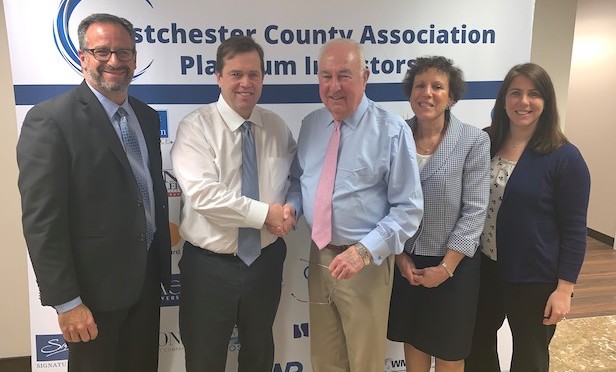 From left, HVEDC Board Chairman Robert J. Levine, Esq., HVEDC CEO Mike Oates, WCA President and CEO William M. Mooney, Jr., WCA Vice President Amy J. Allen, and WCA Managing Director, Operations & Events Julia Emrick.
From left, HVEDC Board Chairman Robert J. Levine, Esq., HVEDC CEO Mike Oates, WCA President and CEO William M. Mooney, Jr., WCA Vice President Amy J. Allen, and WCA Managing Director, Operations & Events Julia Emrick.
WHITE PLAINS—The Westchester County Association, one of the county's leading business advocacy organizations for nearly 70 years, says it intends to merge operations with regional economic development agency the Hudson Valley Economic Development Corp.
The deal announced today between the two organizations is intended to create a regional economic development and business advocacy organization. The WCA and HVEDC announced that their respective organizations have agreed to pursue the merger of the two organizations.
William M. Mooney, Jr., the current president and CEO of the WCA, and Mike Oates, HVEDC CEO, say the merger should be finalized in short order. Mooney, who announced in October his intent to retire, will serve as CEO of the yet-to-be-named organization until his retirement on Sept. 1, 2019. Oates will initially serve as president and then will assume the title of CEO upon Mooney's retirement. Oates in a conference call said that Mooney will likely serve the regional organization on a consultancy basis after his retirement.
The yet-to-be-named organization will be housed at the WCA's current headquarters at 1133 Westchester Ave. in White Plains and will have regional offices in other Hudson Valley locations. All current staff of the two organizations will be retained.
The WCA was founded in 1950, while the HVEDC was formed in 2003 as a regional economic development agency that serves Westchester, Rockland, Putnam, Orange, Ulster, Dutchess and Sullivan counties. At its formation, a primary sponsor of HVEDC was utility Central Hudson Gas & Electric Corp.
“This is an exciting, long overdue opportunity to develop a transformative, integrated business advocacy organization that will focus on economic development throughout the entire Hudson Valley region,” says William P. Harrington, Esq., who will serve as the chairman of the new combined Board of Directors. “This merger will foster a coordinated effort by Westchester and Hudson Valley business leaders, in partnership with government, to create economic development and opportunities that will benefit the entire spectrum of Hudson Valley residents.”
WCA and HCVED officials state that some of the benefits of the merger will include the organization having enhanced legislative power, as well as serving as an independent voice of businesses and the communities it serves with proactive policies and initiatives that foster smart growth and economic vitality in the region. Other functions of the new organization include advocacy for the business community, including on key industry sectors in the Hudson Valley on a local, state and federal level; launching innovative programs for the entire Hudson Valley and offering new channels of distribution for organizations throughout the region.
The new organization appears to be advancing many of the previous initiatives undertaken by the WCA and HVEDC.
For example, the organization states that its focus will include healthcare advocacy and promoting the region as “BioHud Valley,” initiatives that were undertaken by the WCA and the HVEDC respectively.
The organization will also focus on real estate, housing and intends to work closely with the real estate community to advocate for smart growth policies in the Hudson Valley. The organization will also provide up-to-date information about available buildings and sites, identify available incentives and assist in the project approval process. Other core areas of focus will also involve workforce development, cluster development that will foster programming designed to support and grow key industries in the Hudson Valley including biotechnology and healthcare, food and beverage, tourism and hospitality and advanced manufacturing, and call for the advancement of the “Gigabit economy” in the region.
“The WCA and HVEDC have always worked well together,” Mooney says. “The strengths and programs of each organization are complementary and as a unified organization will realize incredible synergies. HVEDC's strength in key industry clusters and their geographic reach is of enormous value to our organization. As we come together to become one organization, we will clearly better serve the needs of Westchester County and the entire Hudson Valley.”
Oates adds, “The merger of the WCA and HVEDC will take advantage of the enormous talent and experience that these two organizations have. We found there are natural synergies between the organizations, as well as individual fortes. HVEDC has a noted history of attracting economic development, while WCA has exhibited a powerful skillset in delivering strong healthcare, workforce development and advocacy programs. Together, we feel these organizational strengths will be a boon for economic development in our region.”
The WCA announced last September a re-branding of the longstanding Westchester County business advocacy organization into what it termed would be Westchester's most “powerful economic development entity.”
Mooney says that the merger deal with HVEDC in fact was done outside of that rebranding initiative.
The Business Council of Westchester, the longstanding competing Westchester County-based business advocacy organization to the WCA, said in a statement concerning the pending WCA-HVEDC merger deal: “We congratulate the WCA and HVEDC on determining succession and their path forward in the Hudson Valley. The Business Council of Westchester now stands alone as the only business, economic development and advocacy organization focused on the county. We take this leadership role very seriously. We remain fully committed to continuing to create economic opportunities for all, to being strong advocates for the interests of our members from both the business and not-for-profit sectors, and to working with our elected officials on all levels.”
© Touchpoint Markets, All Rights Reserved. Request academic re-use from www.copyright.com. All other uses, submit a request to [email protected]. For more inforrmation visit Asset & Logo Licensing.







